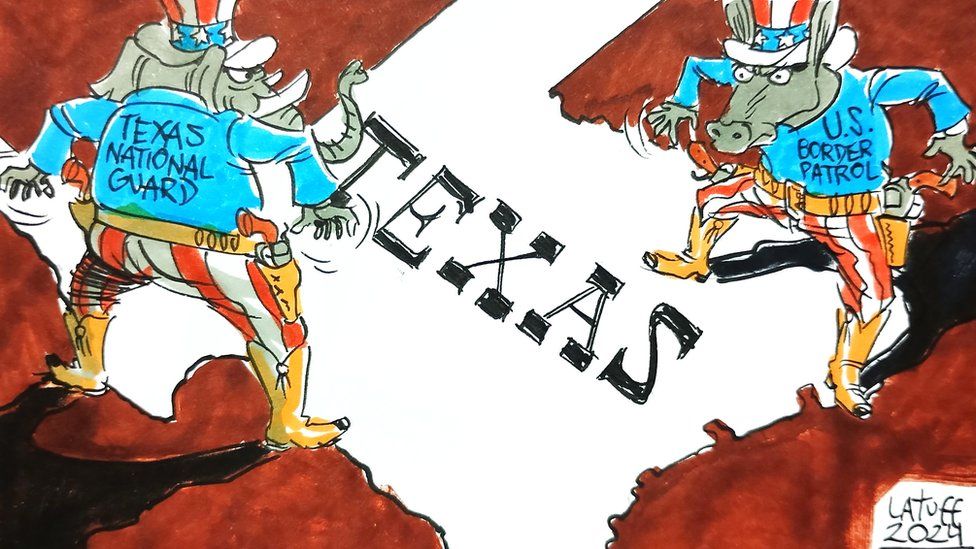ARTICLE AD BOX
 Image source, GLOBAL TIMES
Image source, GLOBAL TIMES
Chinese media have stoked the idea Texas has reached a state of war
By Kerry Allen
BBC Monitoring
Amid the escalating border standoff between Texas and the White House over illegal immigration, misinformation has spread in China that the Lone Star state has officially declared war to secede from the US.
Popular Chinese outlets have been suggesting that events in Texas have led to deep divisions in the US widening to a point where unrest has become a stark reality.
More than 6.3m migrants have crossed into the US illegally since the beginning of 2021 - record highs that have intensified a standoff between President Joe Biden and Texas Governor Greg Abbott.
As part of his Operation Lone Star, Mr Abbott has sought to block or deter entry into his state, including by installing about 30 miles (48km) of razor wire barriers along the city of Eagle Pass.
The US Supreme Court ruled last month against Mr Abbott, but the Republican has vowed to add more razor wire to crack down on what he calls an "invasion".
Trending social media posts in China allege Mr Abbott was preparing to go to war with US federal authorities.
Posts with the hashtag #TexasDeclaresAStateOfWar have been viewed and shared thousands of times on the popular social network Sina Weibo. Some posts have been from a user with millions of followers.
A Voice of America journalist Wenhao, who specialises in Chinese online disinformation, posted on X that the "biggest US related news on China's internet for the past few days is Texas governor declaring war with the federal government, which did not happen in reality".
"Netizens are cheering for what they call America's self destruction," the post added.
Weibo does appear to have taken action to limit such content. A search of posts with the hashtag #TexasDeclaresAStateOfWar now shows a disclaimer, which says: "According to relevant laws, regulations and polices, content on this topic cannot be displayed."
However, many posts are still to be found on the popular platform, which has more than 600 million monthly active users.
While foreign media is largely blocked in China, content from foreign media is often cherry-picked to stoke suggestions of US internal divisions.
Social media users in China today are able to read reports that Florida's Republican governor Ron DeSantis is sending up to 1,000 members of the National Guard to Texas.
Users are circulating pictures of the Texas Military Department flying a picture of a flag above its headquarters with the words "Come and Take It", which have led to domestic perceptions the state is stoking independence.
Old videos from Fox News are also circulating of vigilante groups dressed in camouflage to "defend the border". There are also multiple videos being circulated from Chile of military tanks that are being misattributed to Texas.
Image source, WEIBO
Image caption,This video has been viewed more than 49,000 times after being posted by a user with more than three million followers
As censorship makes it difficult for Chinese users to do their own fact checks, this has given many Weibo users the impression that the state is at war.
Some have suggested that Texas could see a similar situation to Ukraine - which is at war with Russia - noting the two regions have a similar land mass.
Image source, Weibo
Image caption,This image comparing Ukraine's and Texas's land mass has been widely shared in China
Media messaging has made the idea of civil war more believable, as Chinese state media have regularly suggested that political divisions in the US are now so polarised that the country has reached the brink of internal conflict.
The phrase "civil war" has been used repeatedly in Chinese newspapers since the January 2021 Capitol Hill riot. Outlets have often suggested that the popularity of former president Donald Trump during his tenure led "to the inability of the current administration to recover from Trump's presidency".
China often publishes such reports as a response to Western governments issuing critical comments on China's handling of issues in Xinjiang, Hong Kong or Taiwan. It's a way of saying: focus on your own backyard, instead of telling us how to run our country.
This is not exclusive to the US. It's also common to see newspapers amplify suggestions that Scotland is increasingly pushing for self-rule, when UK politicians are critical of the Chinese Communist Party.
The Chinese government maintains it does not interfere in other countries' internal affairs. "This has always been a principle in our foreign policy and is recognized by the international community," it said in a recent statement.

 11 months ago
17
11 months ago
17








 English (US) ·
English (US) ·